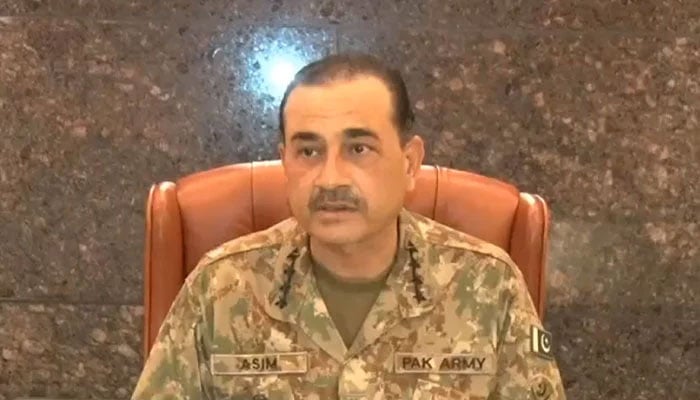A clear message
There was also talk of politically motivated digital terrorism that tries to induce despondency in the nation
At the 83rd Formation Commanders Conference at the General Headquarters (GHQ) presided by Chief of Army Staff (COAS) General Syed Asim Munir, the country’s military leadership called for bringing to justice the planners, perpetrators, abettors, and facilitators of May 9 riots for the "collective good of the country". The military’s media wing has also said that stability in the country will remain hostage to the machinations of such elements without swift and transparent dispensation of justice to the culprits and establishing rule of law. There was also talk of politically motivated digital terrorism that tries to induce despondency in the nation, and sow discord among national institutions and the people of Pakistan by peddling fake news, and propaganda. To those following political developments in the country, this is a clear message that there is no forgiveness for the May 9 attacks.
The denunciation of politically motivated digital terrorism also underscores the evolving nature of contemporary threats. Many had warned that, while political parties have talked about the civil-military imbalance, the May 9 attacks and the direct and dangerous targeting of the military top command on social media would only lead to more animosity rather than a resolution of issues. It is important for the PTI to engage with other political parties to bring down the political temperature and chart a way forward where parliament is strengthened rather than weakening the entire political system due to belligerent politics. The emphasis during the conference on socio-economic development in Balochistan and the newly merged districts shows that there is a recognition of the nexus between economic disparity and security challenges. By addressing root causes of unrest and marginalization, the appeal of extremist ideologies and foreign-sponsored proxies can be undermined. As such, this is the right way to think about this challenge, especially in an effort to redress some legitimate grievances. The military top command also discussed the continued cross-border violations from Afghanistan and terrorism being orchestrated using Afghan soil, India’s oppression in Indian Illegally Occupied Jammu and Kashmir (IIOJK), the persecution of minorities, especially Muslims, in India, and solidarity with the people of Palestine.
On paper, any attempt at rule of law, countering hybrid threats, addressing regional security dynamics, promoting socio-economic development, and engaging in global solidarity is encouraging. Pakistan needs to work towards internal stability as well as keep an eye on regional stability. This will all depend on effective coordination with civilian institutions, sustained diplomatic efforts, and adaptive responses to evolving security challenges.
-
 Jessie Buckley Utters 'wild' Remarks For 'Hamnet' Co-star Emily Watson At Actor Awards
Jessie Buckley Utters 'wild' Remarks For 'Hamnet' Co-star Emily Watson At Actor Awards -
 Who Could Replace Ayatollah Ali Khamenei? Iran’s Top Successor Candidates Explained
Who Could Replace Ayatollah Ali Khamenei? Iran’s Top Successor Candidates Explained -
 Oliver 'Power' Grant Cause Of Death Revealed
Oliver 'Power' Grant Cause Of Death Revealed -
 Michael B. Jordan Makes Bombshell Confession At Actor Awards After BAFTA Controversy: 'Unbelievable'
Michael B. Jordan Makes Bombshell Confession At Actor Awards After BAFTA Controversy: 'Unbelievable' -
 Prince William Willing To Walk Road He ‘loathes’ For ‘horror Show’ Escape: ‘He’s Running Out Of Allies Fast’
Prince William Willing To Walk Road He ‘loathes’ For ‘horror Show’ Escape: ‘He’s Running Out Of Allies Fast’ -
 Pentagon Says No Evidence Iran Planned Attack On US, Undercutting Strike Justification
Pentagon Says No Evidence Iran Planned Attack On US, Undercutting Strike Justification -
 Prince William’s Changes Priorities With Harry After Kate Middleton’s Remission: ‘It Couldn't Be Worse’
Prince William’s Changes Priorities With Harry After Kate Middleton’s Remission: ‘It Couldn't Be Worse’ -
 Justin Bieber Gets Touching Tribute From Mom Pattie Mallette On Turning 32 Amid Limited-edition Birthday Drop
Justin Bieber Gets Touching Tribute From Mom Pattie Mallette On Turning 32 Amid Limited-edition Birthday Drop -
 Jada Pinkett Smith Details How Her Memoir Combats 'shame' Around Alopecia
Jada Pinkett Smith Details How Her Memoir Combats 'shame' Around Alopecia -
 Harrison Ford Reflects On Career As He Receives Life Achievement Award At 2026 Actor Awards
Harrison Ford Reflects On Career As He Receives Life Achievement Award At 2026 Actor Awards -
 Timothee Chalamet's Red Carpet Date For Actor Awards Not Kylie Jenner This Year
Timothee Chalamet's Red Carpet Date For Actor Awards Not Kylie Jenner This Year -
 Weather Forecast For Tomorrow: Wintry Mix Overnight And Warmer Temps Midweek
Weather Forecast For Tomorrow: Wintry Mix Overnight And Warmer Temps Midweek -
 Keith Urban 'solitary' Life Laid Bare After Nicole Kidman Split
Keith Urban 'solitary' Life Laid Bare After Nicole Kidman Split -
 SAG Actor Awards 2026 Winners: Complete List
SAG Actor Awards 2026 Winners: Complete List -
 UK Asylum System Faces Changes As Refugees Will Get Temporary Protection Only
UK Asylum System Faces Changes As Refugees Will Get Temporary Protection Only -
 Meghan Markle Has Realised ‘star Power’ Is Not Enough After Jordan Trip
Meghan Markle Has Realised ‘star Power’ Is Not Enough After Jordan Trip




